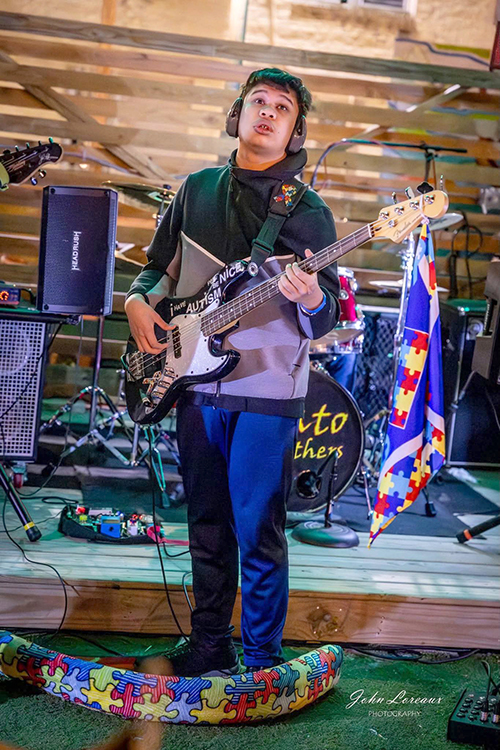By Jerry Ryan
Music has a unique ability to connect people, evoke emotions, and enhance cognitive abilities. For individuals with autism, it serves as both a therapeutic tool and a means of self-expression. With its structured and rhythmic nature, music provides a sense of predictability and engagement, making it particularly effective for those on the autism spectrum. From improving communication skills to fostering emotional regulation, music offers numerous benefits that enhance overall well-being.
This impact is especially evident in the indie music scene, where talented autistic musicians are making waves with their creativity and passion. At the 2025 Elephant Talk Indie Music Festival, artists like Andrew Ace Greenspan, Brandon Chiola and Miggy Arato (of the Arato Brothers Band) are proving that music is not just therapeutic—it’s a powerful form of artistic expression and connection.
1. Enhancing communication skills
Many individuals with autism face challenges in verbal communication, ranging from delayed speech development to difficulty expressing emotions. Music can serve as a bridge to communication by encouraging vocalization, rhythm and word association. Singing, for example, helps individuals practice pronunciation and expand their vocabulary in a fun and engaging way.
2. Improving social skills
Social interactions can be overwhelming for those with autism, but music provides a structured and predictable way to engage with others. Group music activities, such as performing in a band or collaborating with other musicians, encourage turn-taking, cooperation and active listening.

Brandon Chiola exemplifies this, using his performances to engage and connect with audiences, breaking down social barriers and fostering meaningful interactions through music.
3. Supporting emotional regulation
Many individuals with autism experience heightened emotions and sensory sensitivities, which can lead to anxiety, meltdowns or difficulty with self-regulation. Music is a powerful tool for emotional expression and relaxation. Slow, calming music can help reduce stress, while upbeat rhythms can enhance mood and energy levels.
For Miggy Arato, music serves as both an emotional release and a way to manage sensory input, providing a structured outlet for expression.
4. Assisting sensory processing
Sensory processing challenges are common in autism, making it difficult for individuals to interpret and respond to sensory input from their environment. Music therapy can help individuals gradually adjust to auditory stimuli in a controlled and enjoyable way.
The Elephant Talk Indie Music Festival provides an inclusive space where musicians like Greenspan, Chiola and Arato can perform in an environment that celebrates neurodiversity. The festival’s embrace of diverse sounds and styles allows autistic artists to create and share their music in a way that feels comfortable and empowering.
5. Boosting cognitive and academic development
Music enhances cognitive functions such as memory, attention and problem-solving. Learning lyrics, following a rhythm and recognizing patterns in music stimulate brain activity and strengthen neural connections.
Many autistic musicians develop exceptional skills in composition, instrumentation, and performance. Their ability to memorize complex melodies, write intricate lyrics and create unique soundscapes highlights the powerful connection between autism and musical intelligence.
6. Encouraging motor skill development
Playing musical instruments or engaging in rhythmic movements, such as clapping or dancing, helps improve both fine and gross motor skills. Activities like drumming enhance hand-eye coordination, while playing a guitar or piano strengthens finger dexterity.
7. Building self-confidence and self-expression
Music provides individuals with autism a creative outlet to express themselves in a way that may feel more natural than using words. Whether through singing, playing an instrument or composing music, individuals can explore their emotions and ideas freely.
For Andrew Ace Greenspan, music has been a deeply personal and transformative journey.
“Music has been instrumental not just for my recovery but also through my everyday struggles in life. Music is my go-to when I am feeling down or when I need to lift myself up. I was diagnosed as high-functioning autistic at age 18, late in life. It was hard to accept for many years,” he said. “I thought it made me different in ways that I couldn’t be successful with, only to learn that having autism gave me superpowers to write, record, and produce the music that I create. I am very grateful for my talents and to share them, connecting with others. I hope everyone finds this new album I have put out, ‘Livin’ Rough, Hangin’ Tough,’ healing and providing hope in hard times.”
Taking the stage at the Elephant Talk Indie Music Festival is not just about performing—it’s about sharing stories and celebrating unique perspectives. Their music serves as an inspiration to others on the spectrum, proving that autism is not a limitation but a different way of experiencing and interpreting the world.
Conclusion
Music is a powerful tool that can significantly enhance the lives of individuals with autism. Whether through improving communication, fostering social connections, or providing emotional and sensory support, music therapy and musical activities offer numerous benefits.
The presence of autistic musicians at the Elephant Talk Indie Music Festival highlights the profound impact of music as both an art form and a means of personal growth. These musicians are not only making a name for themselves in the indie music scene but also breaking down stereotypes, proving that autism and creativity go hand in hand.
Their performances are a testament to the transformative power of music—one that allows individuals of all abilities to find their voice, connect with others, and share their unique gifts with the world.
⸻
Elephant Talk Indie Music Festival 2025
• Location: Tennessee Avenue Beer Hall, Atlantic City
• Dates: April 11-13
• Featuring: Over 60 bands on two stages over three days
Performance Schedule for Featured Autistic Musicians
April 11
• 5:30 – 5:45 PM – Brandon Chiola
April 13
• 4:45 – 5:15 PM – Arato Brothers
• 7:15 – 8:00 PM – Andrew Ace Greenspan
This year’s festival will be a celebration of diverse talents, featuring incredible autistic musicians who use music to share their voices with the world. Don’t miss the opportunity to experience their inspiring performances live!













